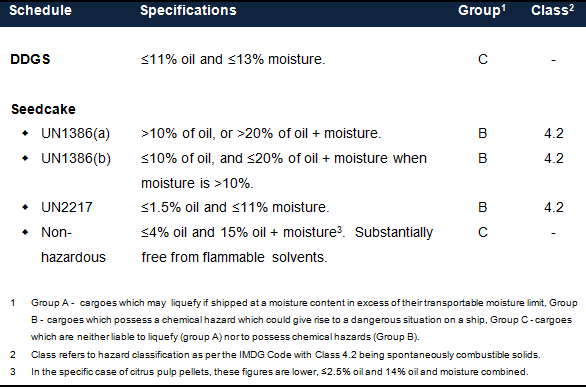Carriage of Bulk Cargoes
Introduction
Distiller’s Dried Grains with Solubles (DDGS) is derived from grain (principally corn), and largely, is the residual material, from the industrial fermentation and distillation of starch-rich grains for ethanol production. Depending on the distillation process, a number of by-products are generated, including distiller’s dried grains (DDG), condensed distiller’s solubles and dried distillers’ solubles. DDGS is made from the blending of DDG and solubles, and has become internationally marketable as a feed for livestock and aquaculture industries. As a result of the growth in the biofuels industry and the increased use of DDGS as a feed globally, DDGS is increasingly being exported on vessels from US ports.
Why is DDGS not a seed cake?
In the past, there was confusion on how DDGS should be classified for bulk shipments. The 2009 edition of the International Maritime Solid Bulk Cargoes (IMSBC) Code (and earlier editions), did not classify DDGS as a separate commodity. In the absence of its own entry, DDGS was often arbitrarily classified as seed cake (i.e. the residue remaining after the removal of oil from seeds or cereals by mechanical crushing or solvent extraction). The reasons that DDGS was classified as seed cake (usually as oil-rich types UN 1386 (a) or (b)) are stated below:
- Both are residual seed/cereal matter, which is rich in oil;
- They have similar physical characteristics, appearances and uses (for example brewers’ grain pellets, the residual material from alcoholic beverage distillation, are listed in the IMSBC Code as a seed cake commodity).
DDGS was added to the 2012 edition of the IMSBC Code, following acceptance of a US Coast Guard proposal in May 2011. DDGS is currently classed as a Group C cargo, neither liable to liquefy nor to possess chemical hazards. However, in order to comply with the Code, a DDGS cargo must have a moisture content of less than 13%, and oil content of less than 11%.
In the 2012 edition of the IMSBC Code there are four different types of seed cake listed and for reference, their specifications compared with DDGS are shown in Table 1 below.
Table 1 Specifications for DDGS and seed cake according to the IMSBC Code.

With few exceptions, seed cake itself is classed as a hazardous cargo (Class 4.2), which may self-heat and, if wet or containing an excessive proportion of unoxidised oil, ignite spontaneously. Prior to shipment, seed cake cargoes require a certificate from a recognised authority confirming their oil and moisture content, as required by the IMSBC Code.
The reason for classifying DDGS as a separate commodity is that in the US, shippers questioned the validity of applying the IMSBC Code’s seed cake schedule to DDGS, given the differences between the two commodities. As a result shippers began putting DDGS cargoes forward for shipment as non-hazardous cargo, with the support of the US Coast Guard who issued cargo authorisation letters to this effect. For the 2012 edition of the IMSBC Code, the US submitted their successful proposal to the International Maritime Organisation (IMO) stating that DDGS should be classified as non-hazardous cargo, as:
- Only minor self-heating was noted in a series tests undertaken;
- Monitoring of voyage temperatures on a number of DDGS shipments showed no notably high cargo temperatures; and,
- No casualties on Lloyd’s Casualty Database between 2000 and 2010 were attributed to the carriage of DDGS cargoes.
Advice to Vessels
Whilst DDGS has been added to the 2012 edition of the IMSBC Code as a non-hazardous Group C cargo, the US tests showed DDGS has some propensity to self-heat due to their high oil and moisture content. If the cargo specification falls within the prescribed oil and moisture content limits, DDGS can be carried as a Group C cargo in accordance with the 2012 edition of the IMSBC Code. However, the vessel should obtain relevant documentation confirming this before loading. Further, as bulk cargoes are not uniform, care should be taken to avoid external heating of the cargo (e.g. bunker tanks) as this could potentially lead to self-heating. Finally, DDGS cargo should be kept dry, and cargo operations should not be undertaken during rainfall.
If Members have any concerns or queries in respect of the carriage of this cargo, they should seek to contact the Association as soon as possible.
The Association would like to thank Mr. Nico Zurcher of Hannaford Forensic Services (Asia) for assistance with this advice for Members.
